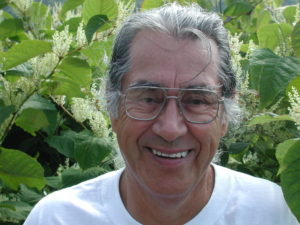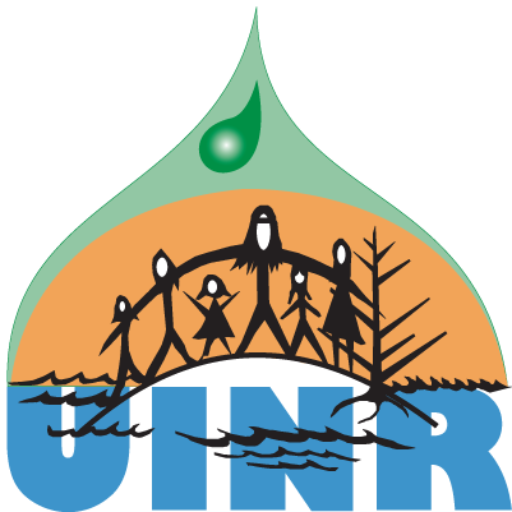by Elder Albert Marshall
 Cape Breton Mi’kmaq Elders have added our voice to the many environmental groups, fishermen’s unions and ordinary citizens opposed to Texas company Hunt Oil’s seismic testing in Sydney Bight. The testing covers an almost 1000 square kilometer area and is as close as 10 kilometers off shore. The Mi’kmaq community was not consulted before the testing began.
Cape Breton Mi’kmaq Elders have added our voice to the many environmental groups, fishermen’s unions and ordinary citizens opposed to Texas company Hunt Oil’s seismic testing in Sydney Bight. The testing covers an almost 1000 square kilometer area and is as close as 10 kilometers off shore. The Mi’kmaq community was not consulted before the testing began.
Despite the findings of many scientific studies showing negative effects from seismic cannons, including the study by the Department of Fisheries and Oceans near Cheticamp in 2003 on the harmful effects on the snow crab harvest, the seismic testing went ahead. Many scientific studies have confirmed what Mi’kmaq fishermen and hunters have known for years; marine mammals and fish avoid areas where seismic surveys are conducted. The noise from the surveys can cause physical damage to fish ears and other organs and in close range can kill adult fish, larvae and eggs and disturb migration routes. The surveys threaten commercial and subsistence fishing and have a negative effect on catch rates.
After the Union of Nova Scotia Indians requested a judicial review of the Canadian Environmental Assessment Act (CEAA) review of the dredging of the Middle Shoal Channel by Little Narrows Gypsum Company in 1996, it was determined that consideration must be given to the impact on the use of the fishery by Mi’kmaq people. Despite this legal finding, no effort was made to contact the community’s Elders by the government regulator, the Canada-Nova Scotia Offshore Petroleum Board in this round of seismic testing. The area being tested is of great importance to our Mi’kmaq people. A framework must be established for Mi’kmaq input in these important decisions.
The importance of traditional knowledge is increasingly recognized as an important component in scientific study. Cape Breton University’s Integrated Science program is leading the way in the international movement towards combining practical, traditional knowledge with scientific practice.
Elders are not opposed to development. Our community needs economic development, jobs for our children. But we have inherent responsibilities not only for our own actions and behaviour toward each other but also that these responsibilities extend to the greater sphere of Creation. We must ensure that we abide by the laws of nature and find the balance between economics and the environment.
In accordance with our beliefs, we do not call resources by that name, rather we call them gifts. We must ensure that these gifts are not used solely for our purposes now, but rather that we will ensure our behaviour will not cause a negative reaction for future generations. We believe in looking thoughtfully at our past and learning from that.
We have a unique opportunity because the courts of law give us a special relationship through treaty rights. We must optimize on these rights. When we see something not proper or sustainable, then we ultimately have responsibility to point out the right direction and be ready and willing to implement recourse. We must indicate a new way of doing things.
We must first look into our past with one eye, see where we come from, learn where we are now. Once we grasp some direction from mistakes we have made, then we are ready to move forward into the future. We must bring forth the knowledge which has been transmitted to us by our ancestors, by the spirits. Our forefathers managed to use the gifts in a balanced way.
We need to learn from other species that have been here longer than us. Listen and observe some of the key players that were put here for a specific purpose. We must adapt the wisdom and clearness with which an eagle sees their natural world, and see what they must do in order to sustain themselves. We must look at other indicators, such as the dragonfly which has been here for thousands of years, and the frog. These are like the canaries in the mine. They warn of us of the seriousness of conditions.
We must humble ourselves in order to make a serious difference, accept that what we call corporate science can no longer be trusted by itself, rather we must listen and adhere to what the natural world is communicating to us.
If and when there are changes, whether sudden or gradual, we must be willing to change course and direction as these changes occur.
We share with all species a dependency upon Mother Earth and upon each other, and that no one species is master over another. Rather the presence of each species is a gift, to be honoured, respected and preserved. We recognize that Mother Earth is seriously ill as a result of our human species living out of balance with her, and we also recognize our responsibility to move toward a restoration of that balance. We can no longer remain silent in the face of, or remain compliant with, other cultural values. We must heed the voices of our Elders as they urge us to bring our teachings forward and journey together with our neighbours to protect Mother Earth. We must be confident in breaking our long silence, and bring forward the gifts of our teachings in order to protect the gifts of species.
